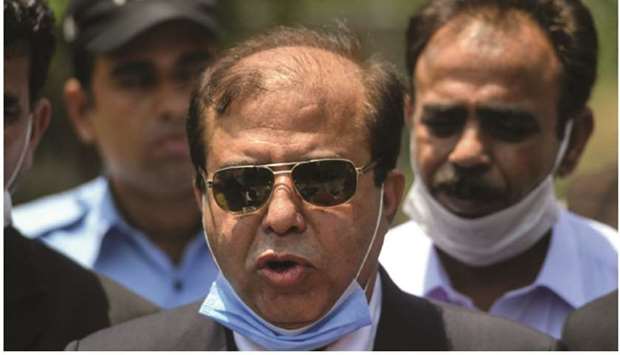An anti-terrorism court in Islamabad has sentenced three men to life in prison for their part in the killing of a Pakistani political leader who was stabbed to death in London in 2010, a government prosecutor said.
The conviction was hailed as “ground-breaking” by British authorities who aided the trial.
Imran Farooq, 50, was a founding member of the Muttahida Qaumi Movement (MQM) party, but had moved to London and had been inactive for about two years.
He was stabbed and beaten to death in Edgware, northwest London as he returned home from work in September 2010.
The judgment was read by Judge Shahrukh Arjumand as the accused appeared before the court through a video link.
“The prosecution has succeeded in proving the case against all three of you,” he remarked at the hearing yesterday.
The accused, Khalid Shamim, Mohsin Ali and Mauzzam Ali, have been in Adiala jail ever since they were arrested.
The court also issued perpetual arrest warrants for MQM founder Altaf Hussain, Iftikhar Hussain, Mohamed Anwar, and Kashif Kamran.
Khalid Shamim, Mohsin Ali and Mauzzam Ali were sentenced to life in prison on “charges of murder under conspiracy and abetment”, special public prosecutor Khawaja Imtiaz told AFP.
The special public prosecutor said the judge also concluded that the murder had been ordered by MQM party chief Altaf Hussain – currently in exile in the UK – and called on the Pakistani and British governments to produce him before a court for trial.
The three accused were members of the party.
Besides their life sentences, the three were each fined Rs1mn ($6,050), the prosecutor, Khawaja Mohamed Imtiaz, told reporters.
The London Metropolitan police said in a statement that the conviction followed “a ground-breaking agreement between the UK and Pakistan” enabling evidence gathered by British police to be shared with Pakistani prosecutors and presented as part of the case.
Britain had its officers testify at the trial, according Barrister Toby Cadman, counsel to the Pakistani government.
The collaboration followed a “temporary change” to Pakistani law to provide that the death penalty would not be used in cases where evidence had been transferred from a state where capital punishment is prohibited, the Met statement said.
In Pakistan, murder usually carries the death penalty.
Khawaja Imtiaz said that the trial was a first for Pakistan and had set a legal precedent.
“There are hardly any examples in the world that an offence is committed in one country and the trial is conducted in another,” he said.
Farooq’s death marked the start of cracks in the leadership of the MQM.
Critics of the MQM – once the most powerful political force in Pakistan’s biggest city of Karachi – have claimed that the killing of Farooq was linked to an internal dispute in the party, which has been run from London by Hussain for over two decades.
The MQM have strongly denied the claims.
The party later split into several factions – one of which is a coalition member of the current Pakistani government.
The party represents Urdu-speaking migrants from India who settled in Pakistan after the partition of the subcontinent at the end of British rule in 1947.
“Today’s conviction marks a team effort between law agencies in the UK and Pakistan working together to get justice for the murder of Dr Imran Farooq,” said British High Commissioner to Pakistan Christian Turner.
Farooq was twice elected as an MP in Pakistan, but went into hiding in 1992 when the government ordered a military crackdown against party activists, and claimed asylum in Britain in 1999.
He was wanted in Pakistan on scores of charges including torture and murder related to the MQM’s activities, but always claimed the accusations were politically-motivated.
The MQM was blamed for years of fomenting ethnic violence in the sprawling city.
It clashed repeatedly with authorities until security forces launched a “clean-up” operation in 2013.
The MQM lost its hold on Karachi during 2018’s general election.
The court in its detailed order stated that it had been proven that MQM founder Altaf Hussain gave the orders to murder Farooq.
“Two senior leaders of MQM-London brought this message to Pakistan,” said the court in its 39-page order.
It added that Moazzam Ali picked the other two from the then-MQM headquarters Nine Zero.
“Mohsin Ali and Kashif Kamran were selected for murdering Imran Farooq,” said the order, adding that both were taken to London and given support to carry out the crime.
According to the judgment, the sole purpose of the murder on the orders of the MQM founder was to remove political opponents within the party.
“The aim of the murder was to ensure that no one raises the voice against the party founder,” said the order.

Imtiaz: There are hardly any examples in the world that an offence is committed in one country and the trial is conducted in another.
